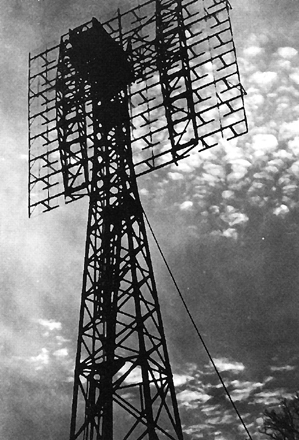Project Diana (nonfiction): Difference between revisions
(Created page with "thumb|Project Diana antenna.'''Project Diana''', named for the Roman moon goddess Diana, was an experimental project of the US Army Signal C...") |
No edit summary |
||
| (One intermediate revision by the same user not shown) | |||
| Line 5: | Line 5: | ||
The first successful echo detection came on 10 January 1946 at 11:58am local time by John H. DeWitt and his chief scientist E. King Stodola. | The first successful echo detection came on 10 January 1946 at 11:58am local time by John H. DeWitt and his chief scientist E. King Stodola. | ||
Project Diana marked the birth of radar astronomy later used to map Venus and other nearby planets, and was a necessary precursor to the US space program. It was the first demonstration that terrestrial radio signals could penetrate the ionosphere, | Project Diana marked the birth of radar astronomy later used to map Venus and other nearby planets, and was a necessary precursor to the US space program. It was the first demonstration that terrestrial radio signals could penetrate the ionosphere, opening the possibility of radio communications beyond the earth for space probes and human explorers. It also established the practice of naming space projects after Roman gods, e.g., Mercury and Apollo. | ||
== In the News == | == In the News == | ||
| Line 23: | Line 23: | ||
* [https://en.wikipedia.org/wiki/Project_Diana Project Diana] @ Wikipedia | * [https://en.wikipedia.org/wiki/Project_Diana Project Diana] @ Wikipedia | ||
[[Category:Nonfiction (nonfiction)]] | [[Category:Nonfiction (nonfiction)]] | ||
| Line 29: | Line 28: | ||
[[Category:Mathematicians (nonfiction)]] | [[Category:Mathematicians (nonfiction)]] | ||
[[Category:People (nonfiction)]] | [[Category:People (nonfiction)]] | ||
[[Category:Physicists (nonfiction)]] | [[Category:Physicists (nonfiction)]] | ||
Latest revision as of 12:51, 29 December 2016
Project Diana, named for the Roman moon goddess Diana, was an experimental project of the US Army Signal Corps in 1946 to bounce radar signals off the Moon and receive the reflected signals.
This was the first experiment in radar astronomy and the first active attempt to probe another celestial body. It was the inspiration for later EME (Earth-Moon-Earth) communication techniques.
The first successful echo detection came on 10 January 1946 at 11:58am local time by John H. DeWitt and his chief scientist E. King Stodola.
Project Diana marked the birth of radar astronomy later used to map Venus and other nearby planets, and was a necessary precursor to the US space program. It was the first demonstration that terrestrial radio signals could penetrate the ionosphere, opening the possibility of radio communications beyond the earth for space probes and human explorers. It also established the practice of naming space projects after Roman gods, e.g., Mercury and Apollo.
In the News
Fiction cross-reference
Nonfiction cross-reference
External links:
- Project Diana @ Wikipedia
